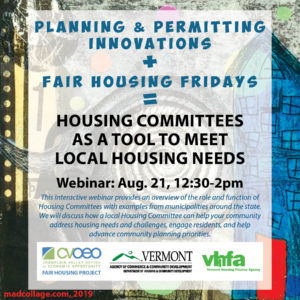There is no doubt that this is an extraordinary and, for many, devastating moment in our history. It is a time of great loss but also of rapid rebuilding of our social support structures. To help mitigate the short-term economic impacts of the COVID-19 pandemic and create strategies for long-term business and community recovery, Governor Phil Scott created the Economic Mitigation and Recovery Task Force. The task force includes leaders across Vermont from credits unions, power companies, job creators, and community leaders.

One of the tools to emerge from the Economic Mitigation and Recovery Task Force is this Tool for Municipal Engagement for Diversity, Equity, and Inclusion. As part of the task force’s work brainstorming and compiling resources for community recovery, this tool was created for municipalities and local leaders to help increase the vibrancy of their communities by creating a culture of inclusion. At the Fair Housing Project, we know that inclusivity and diversity in housing is critical to those efforts.
It is clear that health disparities and economic struggles have hit groups who have been historically marginalized the hardest, which is as true during the COVID-19 pandemic as it has been with preceding national emergencies. This new tool calls on municipalities and local leaders to first acknowledge the privilege that comes from being a part of the dominant culture, and to recognize that if no action is taken in the way outlined in this tool, policies will continue to benefit those in a dominant position.
The Fair Housing Project of CVOEO goes a step further to remind our readers that historically our Federal Government has gone so far as to enact policies to intentionally benefit white families and individuals, such as participating in red lining practices and by excluding people of color from the benefits of the GI Bill. Housing discrimination predates these policies, and though the Fair Housing Act was created to mitigate these discriminatory practices, housing discrimination continues to be a major issue across the country with the rollback of the Affirmatively Furthering Fair Housing rule and the recent proposed rollbacks to protections for transgendered people experiencing homelessness.
In Vermont, the fair housing protections have been expanded to include seven additional protected classes, so in addition to it being illegal to deny housing based on race, color, country of national origin, religion, family status, sex and disability, it is also illegal to deny housing for gender identity, age, sexual orientation, marital status, receipt of public assistance, abuse sexual assault or stalking, and denial housing development based on the income of the prospective residents. The Tool for Municipal Engagement for Diversity, Equity, and Inclusion calls on local leaders and municipalities to host conversations on Justice, Equity, Diversity, and Inclusion (JEDI), and guides readers to model resources across Vermont.
The tool also calls for municipalities to:
- Ensure accessibility for people of varying abilities by designating a group to receive and address accommodation inquiries and complaints.
- Invite new people to participate in municipal meetings in more accessible ways.
- One of the ways to break down barriers to having an impact in municipal government for people from more marginalized or stressed communities is by doing outreach in a more equitable way. Front Porch Forum and working with mutual aid groups that have already organized are a few of the recommended ways to reach a broader range of people.
- Consider ways to support economic development of Minority- and Women-owned Business Enterprises (MWBEs)
- Evaluate opportunity for small-scale housing and business in local zoning. From the perspective of the CVOEO Fair Housing Project, starting a Housing Committee (with an emphasis on Fair Housing, of course) is a great way to meet this goal from the housing entry point. The video below includes more information on why a Housing Committee is critical in this moment, and you can find the Housing Ready Toolkit here
- Create a Diversity and Equity Commission and support schools in curriculum development.
- Translate materials into other languages, with the most common languages outside of English in Vermont being: French, Nepali, Somali, Swahili, Burmese, Vietnamese, Arabic, Mandarin, and Spanish.
- Language access was a major gap in our state’s Covid response, but some grassroots organizers like Iceberg Consulting took matters in their own hands and were able to translate important materials for non-English speaking communities.
- And lastly, to better understand which communities are being served and represented in municipal government, break down data on the programs the municipality administers by race, disability status, and other demographics.
